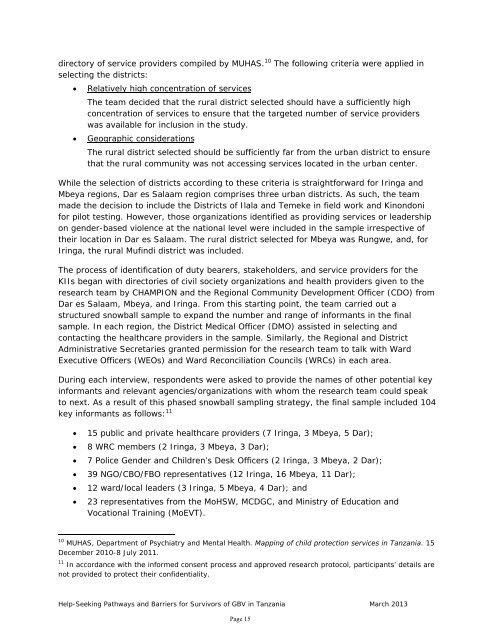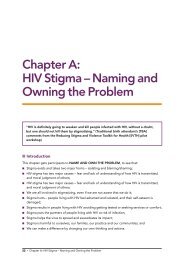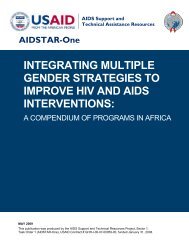Download PDF - ICRW
Download PDF - ICRW
Download PDF - ICRW
Create successful ePaper yourself
Turn your PDF publications into a flip-book with our unique Google optimized e-Paper software.
directory of service providers compiled by MUHAS. 10 The following criteria were applied in<br />
selecting the districts:<br />
Relatively high concentration of services<br />
<br />
The team decided that the rural district selected should have a sufficiently high<br />
concentration of services to ensure that the targeted number of service providers<br />
was available for inclusion in the study.<br />
Geographic considerations<br />
The rural district selected should be sufficiently far from the urban district to ensure<br />
that the rural community was not accessing services located in the urban center.<br />
While the selection of districts according to these criteria is straightforward for Iringa and<br />
Mbeya regions, Dar es Salaam region comprises three urban districts. As such, the team<br />
made the decision to include the Districts of Ilala and Temeke in field work and Kinondoni<br />
for pilot testing. However, those organizations identified as providing services or leadership<br />
on gender-based violence at the national level were included in the sample irrespective of<br />
their location in Dar es Salaam. The rural district selected for Mbeya was Rungwe, and, for<br />
Iringa, the rural Mufindi district was included.<br />
The process of identification of duty bearers, stakeholders, and service providers for the<br />
KIIs began with directories of civil society organizations and health providers given to the<br />
research team by CHAMPION and the Regional Community Development Officer (CDO) from<br />
Dar es Salaam, Mbeya, and Iringa. From this starting point, the team carried out a<br />
structured snowball sample to expand the number and range of informants in the final<br />
sample. In each region, the District Medical Officer (DMO) assisted in selecting and<br />
contacting the healthcare providers in the sample. Similarly, the Regional and District<br />
Administrative Secretaries granted permission for the research team to talk with Ward<br />
Executive Officers (WEOs) and Ward Reconciliation Councils (WRCs) in each area.<br />
During each interview, respondents were asked to provide the names of other potential key<br />
informants and relevant agencies/organizations with whom the research team could speak<br />
to next. As a result of this phased snowball sampling strategy, the final sample included 104<br />
key informants as follows: 11<br />
<br />
<br />
<br />
<br />
<br />
<br />
15 public and private healthcare providers (7 Iringa, 3 Mbeya, 5 Dar);<br />
8 WRC members (2 Iringa, 3 Mbeya, 3 Dar);<br />
7 Police Gender and Children’s Desk Officers (2 Iringa, 3 Mbeya, 2 Dar);<br />
39 NGO/CBO/FBO representatives (12 Iringa, 16 Mbeya, 11 Dar);<br />
12 ward/local leaders (3 Iringa, 5 Mbeya, 4 Dar); and<br />
23 representatives from the MoHSW, MCDGC, and Ministry of Education and<br />
Vocational Training (MoEVT).<br />
10 MUHAS, Department of Psychiatry and Mental Health. Mapping of child protection services in Tanzania. 15<br />
December 2010-8 July 2011.<br />
11 In accordance with the informed consent process and approved research protocol, participants’ details are<br />
not provided to protect their confidentiality.<br />
Help-Seeking Pathways and Barriers for Survivors of GBV in Tanzania March 2013<br />
Page 15

















